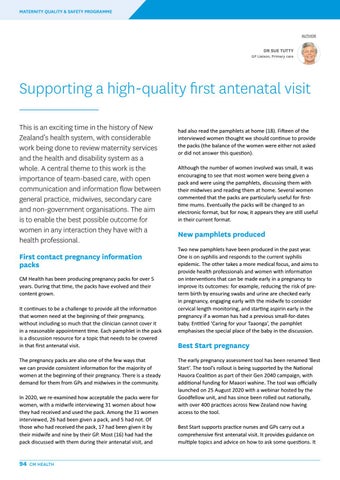MATERNITY QUALITY & SAFETY PROGRAMME
AUTHOR
DR SUE TUTTY
GP Liaison, Primary care
Supporting a high-quality first antenatal visit This is an exciting time in the history of New Zealand’s health system, with considerable work being done to review maternity services and the health and disability system as a whole. A central theme to this work is the importance of team-based care, with open communication and information flow between general practice, midwives, secondary care and non-government organisations. The aim is to enable the best possible outcome for women in any interaction they have with a health professional. First contact pregnancy information packs CM Health has been producing pregnancy packs for over 5 years. During that time, the packs have evolved and their content grown. It continues to be a challenge to provide all the information that women need at the beginning of their pregnancy, without including so much that the clinician cannot cover it in a reasonable appointment time. Each pamphlet in the pack is a discussion resource for a topic that needs to be covered in that first antenatal visit. The pregnancy packs are also one of the few ways that we can provide consistent information for the majority of women at the beginning of their pregnancy. There is a steady demand for them from GPs and midwives in the community. In 2020, we re-examined how acceptable the packs were for women, with a midwife interviewing 31 women about how they had received and used the pack. Among the 31 women interviewed, 26 had been given a pack, and 5 had not. Of those who had received the pack, 17 had been given it by their midwife and nine by their GP. Most (16) had had the pack discussed with them during their antenatal visit, and
94 CM HEALTH
had also read the pamphlets at home (18). Fifteen of the interviewed women thought we should continue to provide the packs (the balance of the women were either not asked or did not answer this question). Although the number of women involved was small, it was encouraging to see that most women were being given a pack and were using the pamphlets, discussing them with their midwives and reading them at home. Several women commented that the packs are particularly useful for firsttime mums. Eventually the packs will be changed to an electronic format, but for now, it appears they are still useful in their current format.
New pamphlets produced Two new pamphlets have been produced in the past year. One is on syphilis and responds to the current syphilis epidemic. The other takes a more medical focus, and aims to provide health professionals and women with information on interventions that can be made early in a pregnancy to improve its outcomes: for example, reducing the risk of preterm birth by ensuring swabs and urine are checked early in pregnancy, engaging early with the midwife to consider cervical length monitoring, and starting aspirin early in the pregnancy if a woman has had a previous small-for-dates baby. Entitled ‘Caring for your Taaonga’, the pamphlet emphasises the special place of the baby in the discussion.
Best Start pregnancy The early pregnancy assessment tool has been renamed ‘Best Start’. The tool’s rollout is being supported by the National Hauora Coalition as part of their Gen 2040 campaign, with additional funding for Maaori wahine. The tool was officially launched on 25 August 2020 with a webinar hosted by the Goodfellow unit, and has since been rolled out nationally, with over 400 practices across New Zealand now having access to the tool. Best Start supports practice nurses and GPs carry out a comprehensive first antenatal visit. It provides guidance on multiple topics and advice on how to ask some questions. It






















